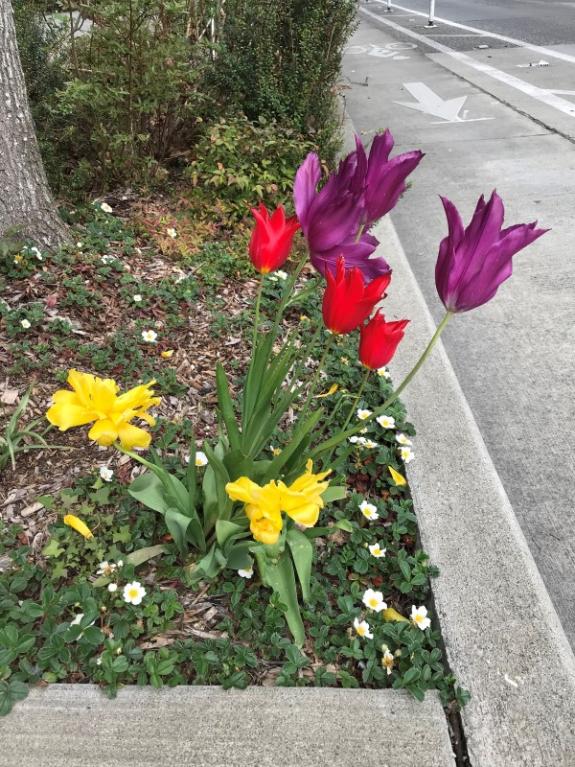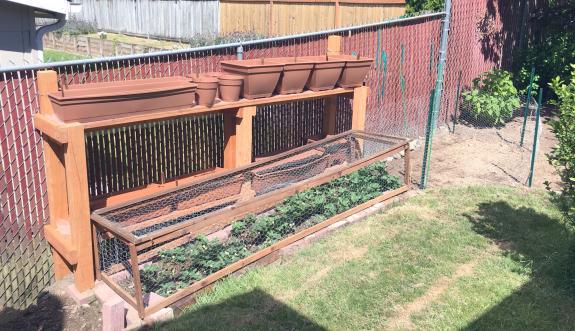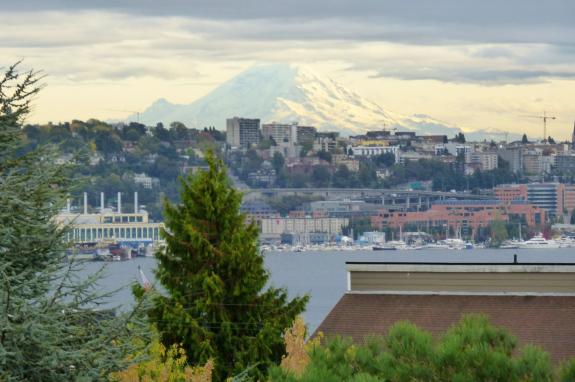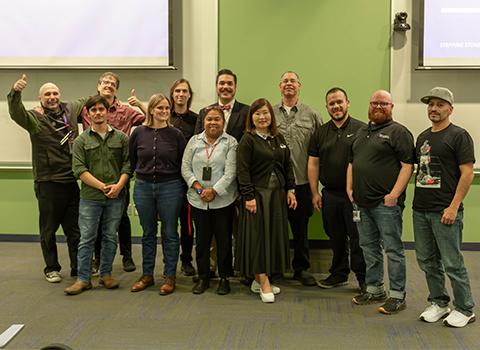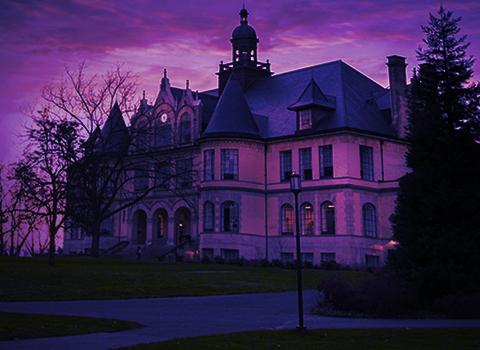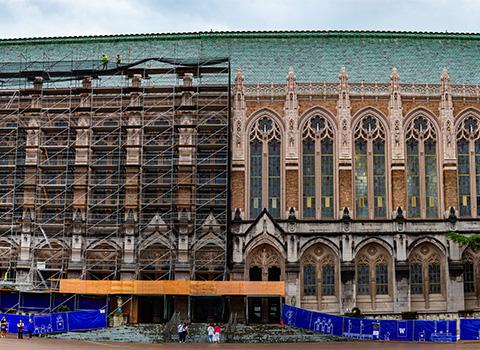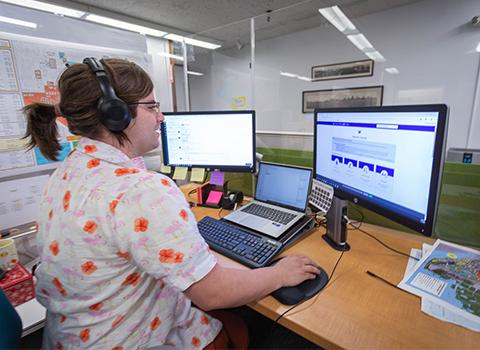How we’re coping in a COVID-19 world
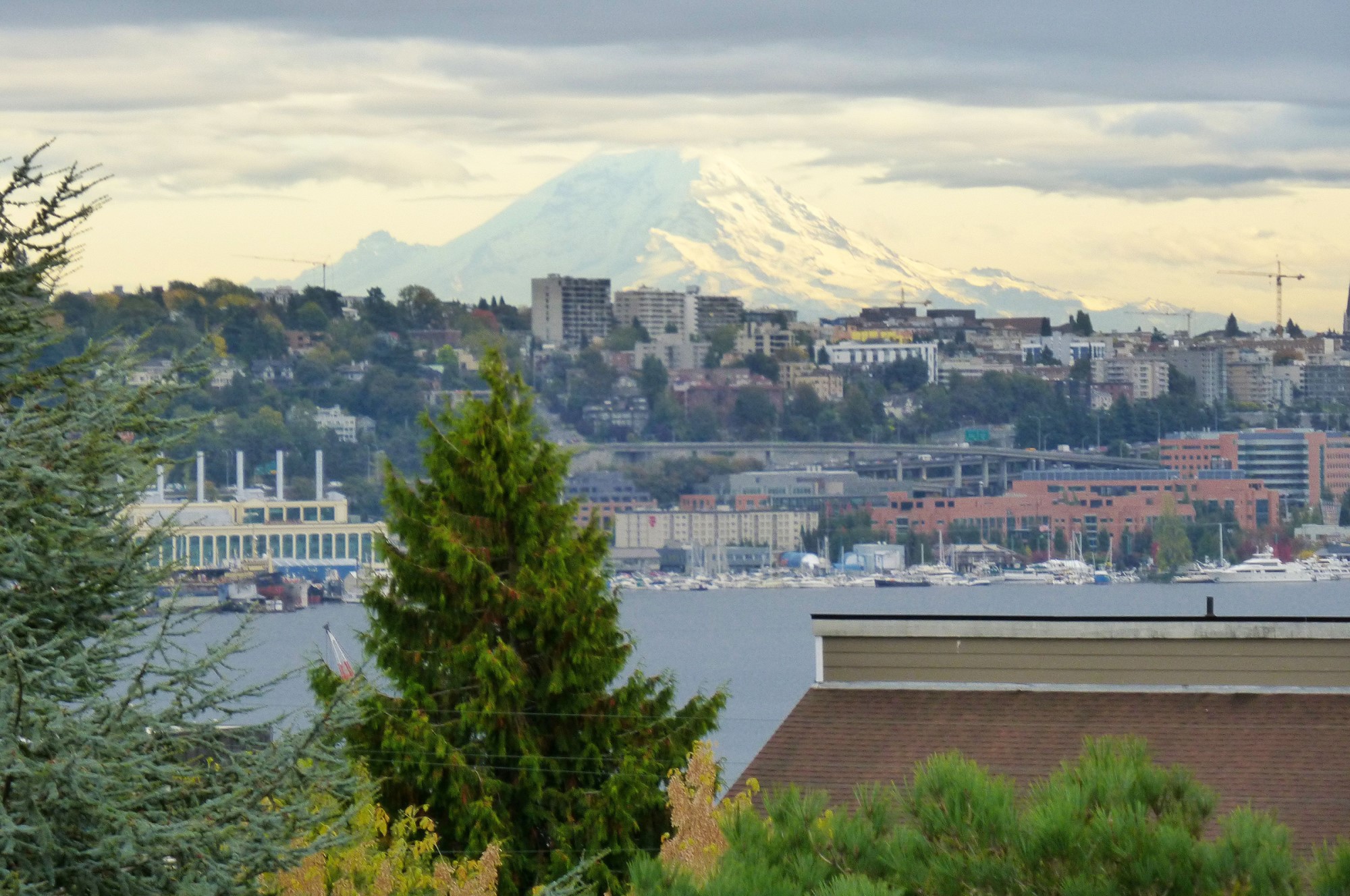
“To plant a garden is to believe in tomorrow.” - Audrey Hepburn
UW Facilities staffers are a resilient, resourceful bunch. They say they’re getting through life’s new routines gradually, and many are turning to meditation, reading and gardening as sources of hope and promise for a brighter future. Here's how they're dealing with the challenges of living through a pandemic, in their own words:
Adjusting to the new 'normal'
Adjusting to the new 'normal'
Katie Kadwell is a gardener in Maintenance & Construction. She's adjusting to a new schedule on campus:
“I love being outdoors in all weather and have the pleasure to work with some of the most heartfelt and loving folks I’ve ever known. I really feel blessed to be part of this shop, part of a union, and part of the UW community. Since Governor Inslee’s stay at home order, we have been rotating through at about 30 percent capacity, having eight out of about 30 gardeners in the shop per day, plus an irrigation mechanic and one supervisor.
Although communication has at times been frustratingly slow and confusing, I have felt very supported by our shop supervisors, UW leadership, and the union. I feel grateful to be where I am right now as I watch much of the country, including some friends and family, being put out of work or having little support for physical distancing. When the distancing requirements were clarified for those of us who need to come to campus, we gardeners had a bit of a chuckle since most of us enjoy being left to ourselves and not having to interact much. That said, I am greatly missing many of my colleagues I can’t see right now. At home I’m getting lots of interaction, since my husband and I have two girls, a 13-year-old and a 10-year-old. They are doing a lot of school work and online socializing, but our youngest is extremely gregarious and extroverted and needs a lot of interaction from me and her dad while at home.
One of the saddest things for the work I do at the UW has been that so many of the most beautiful things are being missed on campus right now. We had to ask people not to congregate to see the cherry blossoms in the quad, and on a smaller scale we planted lots of new bulbs and flowers last year that are now beginning to bloom. There are many little details we gardeners added in places on campus over the past year that will unfortunately not get seen by staff and students this spring, and that’s a little piece of grief I hold around this pandemic.
I continue to enjoy my time at home working in the garden, going on family walks, having time to play music together as a family, and eating more meals at home together. The pace of life right now actually feels more right to me, as I’ve had a chance to watch spring arrive without having to be at work as much as usual, I’ve been feeling like our planet and nature like this pace."
Farmer McMaster
Farmer McMaster
Ken McMaster is an AiM trainer in Business Innovation and Technology but at home, growing vegetables is second nature:
“I grew up on a farm, now I have my own mini farm, " Ken says. Indeed, he's got a lot of staples on the way, including beets, radishes, kohlrabi, peas, Brussels sprouts, onions and broccoli. He has built a shelf for his pots and an enclosed area to keep his veggies from being devoured by rabbits.
“When I was first told we would be working remotely I honestly had no idea how I was going to make things work. My job involves a lot of in-person contact with others, and having that contact is the easiest and most effective way to do my job. With the new norm of social distancing and working from home however, meeting with others face-to-face became more or less impossible, and a new strategy was required.
The first few weeks of working from home were challenging because I had to learn new technologies, and completely rethink how I did my job. I had to figure how I could still effectively serve and help the people I work with every day. My schedule and routine also changed and required rethinking. Over time however, I adapted, figured things out and established a new normal.
I think one of the things that has helped me cope is I have realized a lot of the things that are harder now in the new norm, or things that I miss about my old norm are actually tradeoffs. For instance while parts of my job are harder, others are much easier. While I really miss seeing my coworkers, my non-existent commute gives me an hour and a half back in my day, and I can still reach out to my coworkers with technology. I am doing less laundry because I don’t have to dress up for work, but I am doing way more dishes because I am eating more meals at home. It seems like for the most part each change “good” or “bad” has been accompanied by a balancing one.
The other thing that has been keeping me sane during this time of upheaval is my yard and gardening. While everything around me has changed the grass still grows and needs to be trimmed, weeds still come up and need to be pulled and the things growing in the yard still need tending.
Each year I do a fun yard project. I grew up on a farm so this year’s project is vegetables. It has been a lot of work and has kept me busy, but it has also been fun and rewarding. I built a shelf to take better advantage of a sunny area in the yard and found a few other sunny spots to scatter the veggies around. I have radishes, broccoli, Brussels sprouts, beets, potatoes, onions, corn, peas and carrots. So far everything but the peas and carrots have come up, but I planted these a little later so there is still hope. Now all I have to do is figure out how keep the bunnies and squirrels away from everything, but that is just the next task in the never-ending cycle that is yard work and gardening.
The yard is one of the few things that has stayed the same as before and is still a quiet place I can retreat to. My work there has really helped me weather all the other changes.
'Tune out for a while'
'Tune out for a while'
Dale Lyman is an irrigation specialist and maintenance mechanic with Shop 10 in Maintenance & Construction. He has the following advice:
“It is not until I come to work that I am reminded how much the world is changing and how much influence the media plays on our daily lives and perpetuates this massive, collective hysteria. Maybe people should tune out for a while and go about living their lives. Learn to be self-sufficient, don’t be dependent on government or others to take care of you. Plan ahead in life and be proactive about your family’s well-being and security. Being dependent on others, living in fear and perpetuating it, this is no way to live for me.
Don’t believe everything you see on television or the internet.”
No more travel
No more travel
Eric Wahl is a program coordinator for the UW Surplus warehouse and has a more complicated COVID-19 story:
“For the past year, my husband and I have been living bi-coastal with me in Seattle and him in New York City working for the American Museum of Natural History. We had been flying back and forth on long weekends or taking vacation time for a week here and there, but Seattle and then New York City became hotspots for COVID-19, and each governor issued stay-at-home orders that changed our lives significantly — no more travel.
Luckily, we have each been able to telework, something for which I have been grateful to Facilities to be able to do. Pete and I speak every evening to catch up and plan next steps, but the separation is no fun, and staying at home except for necessities like groceries can feel especially isolating despite things like Zoom and FaceTime.
Also, my father is in hospice care in southern Arizona, and my brother and I had been trading off visiting him every other month, but now, of course, we can’t do that as his facility is on lockdown. Unfortunately, our dad doesn’t understand why we can’t visit despite all our best explanations, so we’ve been able to work with his care center to set up Zoom visits all together, which has been a blessing.
Despite all of this, we press on, and the whole experience has been a good reminder that everyone we know has been affected by this pandemic in some way or other; we all have stories about our unique circumstances and coping mechanisms (mine is reading — out on the balcony as much as possible, to get some sun and meditate while watching boats on Lake Union). I find I’m missing my physical workplace and the comradery with colleagues that we can take for granted. If anything, my pandemic experience has caused me to take stock of all the things in my life for which I’m lucky and to be better at vocalizing appreciation for those things.
Missing shared meals
Missing shared meals
Liz Penttila is an organizational development specialist with Maintenance & Construction:
“I’m telecommuting full time, which is both great and frustrating. There are so many things I can’t accomplish from home and ways I can’t contribute to what’s going on, but at the same time my being onsite is just one more source of germs for our campus community.
My partner works in healthcare and continues to go into the hospital every day — he’s worried about bringing it home, possibly even spreading COVID-19 to our friends and family. We’ve been doing more Zooms, Hangouts, Meets, but more and more it seems like someone just isn’t up to it, or is slightly-off-center with regard to eye contact and delayed responses, and talking about an uncertain time when it’s over.
Today is my birthday and I love the emails and texts I’m getting — but I can’t help but miss sharing a big meal with my loved ones. Here’s to a quiet remainder of 2020!”
The power of meditation
The power of meditation
A longtime Facilities employee who wished to remain anonymous looks to self-guided daily meditations to keep her calm:
“Basically, I’ve been coping by leaning into my spiritual practice. I do at least 10 minutes of meditation in the morning. The thing I’ve learned about meditation is even doing it for three minutes can benefit. Oh, and focus on the breath of course.
I do a lot of reading, sometimes for fun. Some reading is inspirational. At the top of my list, is When Things Fall Apart by Pema Chödrön. This is a timely, practical little book written some 20 years ago that deals with times just like the one we are in. Wise and heartening.”
'Little miracles'
'Little miracles'
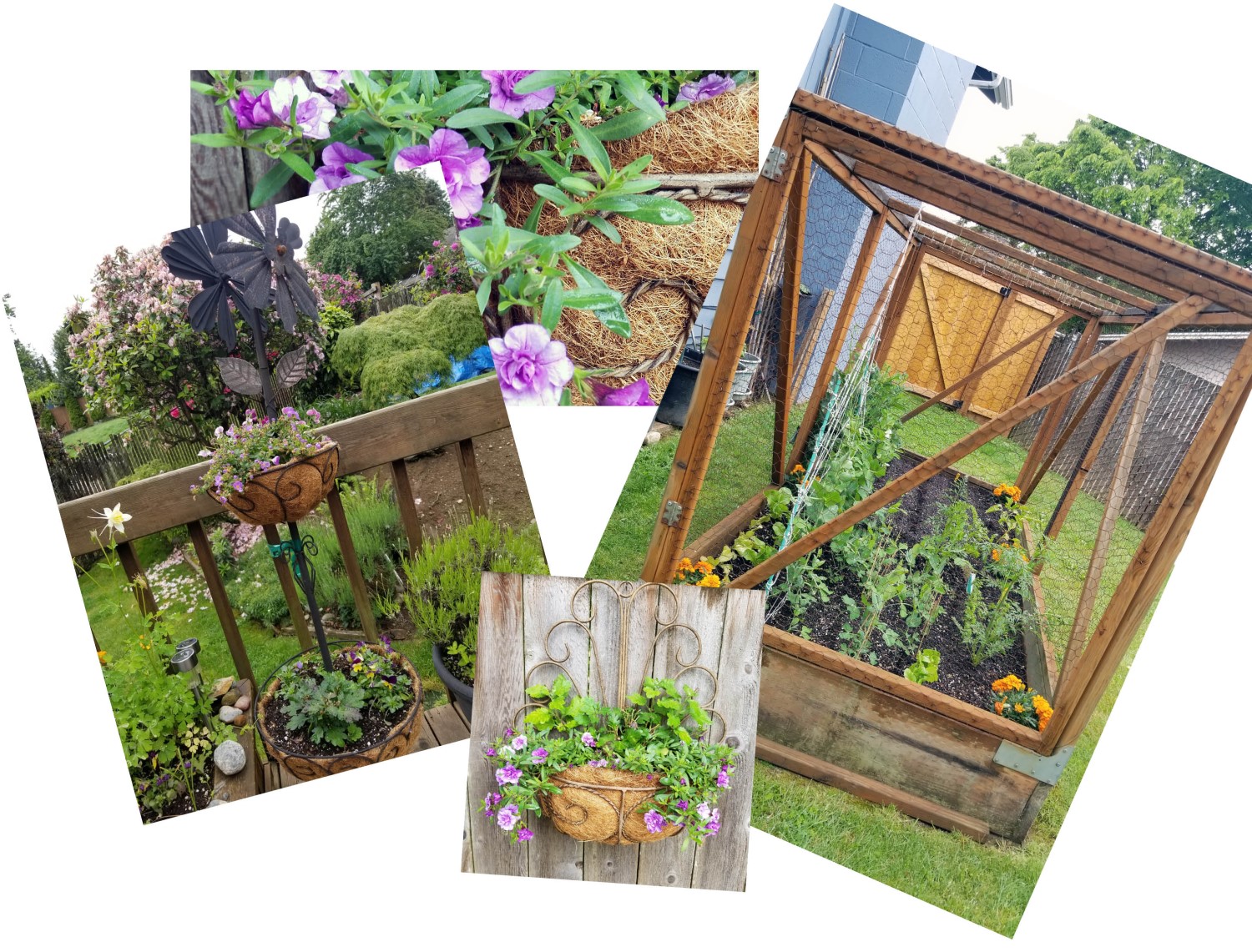
Chris Pennington's garden includes annuals, perennials, herbs and vegetables. Photos by Chris Pennington.
UW Facilities Safety Analyst Chris Pennington says, “ I come from a family of gardeners and have been gardening since I was very young. Being at one with nature is so gratifying and gives me the feeling of being in tune with the earth.
Seeing the result of what comes from one seed, and the flower/fruit/vegetable that comes from that to enjoy is like watching little miracles every day. Plus gardening connects us to others, sharing our techniques, accomplishments and failures. Making the world a beautiful place through gardening makes me feel so good!”
